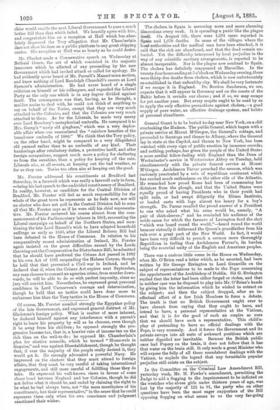There was a curious little scene in the House on
Wednesday, when Mr. O'Brien read a letter which, as he asserted, had been written by Sir George Errington to Lord Granville on the subject of representations to be made to the Pope concerning the appointment of the Archbishop of Dublin. Sir G. Errington replied that the letter had been either forged or stolen, and that in neither case was he disposed to play into Mr. O'Brien's hands by giving him the information which he wished to extract on the subject; and then the subject dropped, after an in- effectual effort of a few Irish Members to force a debate. The truth is that no British Government ought ever to have shrunk from saying that they ought to have, and intend to have, a personal representative at the Vatican, and that it is for the good of such an empire as ours that we should have such a representative. This child's- play of pretending to have no official dealings with the Pope, is very unmanly. And it forces the Government and its private envoys into all sorts of awkward positions which are neither dignified nor inevitable. Because the British public once had Popery on the brain, it does not follow that it has that water on the brain still. It only needs a great Minister who will expose the folly of all these roundabout dealings with the Vatican, to explode the legend that any formidable popular prejudice still exists on the subject.


































 Previous page
Previous page